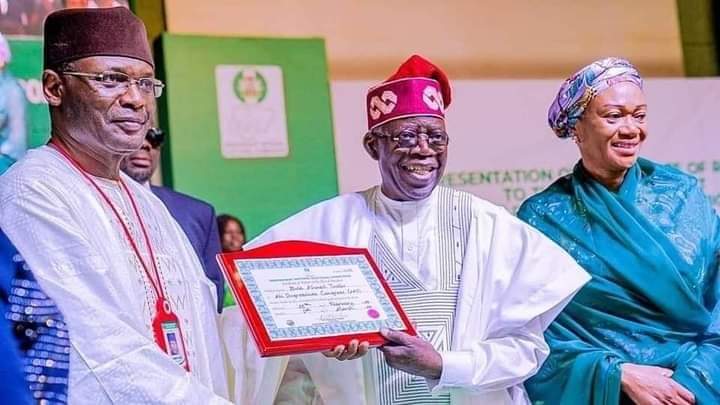Court may disqualify Tinubu for having dual citizenship, lying while under oath
2 min read
Bola Ahmed Tinubu
Nigeria’s president-elect Bola Tinubu appeared to have lied to the Independent National Electoral commission while under oath following his dual citizenship of Guinea Conakry.
Guinea Conakry is a country located on the West coast of Africa, between Guinea Bissau and Sierra Leone.
On Sunday, News Band reports that, David Hundeyin, an independent investigative journalist shared images of a Guinean diplomatic passport bearing “Bola Ahmed Tinubu” on his Twitter account. The passport also carried Mr Tinubu’s image believed to have been issued in October 2015.
The dual citizenship, which has caused Mr Tinubu to trend online would likely dominate public discourse amid the ongoing election petition trial.
According to Nigeria’s constitution, Members of the government, like the president, governor, or state and national legislators cannot have dual citizenship. Having dual citizenship automatically disqualifies the individual from seeking elective post.
Section 137 (1)(a) of the Nigerian law said a person shall not be qualified to be president if “he has voluntarily acquired the citizenship of a country other than Nigeria.”
Though, courts have repeatedly interpreted that section of the constitution as inapplicable to a Nigerian-born or a citizen born to either a Nigerian parent or both parents.
But the charge of perjury still knocks on the door of Mr Tinubu, who, in his form EC-9 application for the presidency, told the Independent National Electoral Commission (INEC) that he never obtained citizenship of another country.
Mr Tinubu ticked “NO” in response to “Have you voluntarily acquired citizenship of any other country” posed by INEC in the form.
He also appended his signature on the form swearing that the information given on the form was “correct, true and to the best of my knowledge.”
While it may not be an issue that Mr Tinubu, who was born in Nigeria, carries dual nationality, he is expected to fight to exonerate himself of perjury charges that would likely be slammed against him.
The president-elect also faced a similar legal battle shortly after he was elected governor of Lagos in 1999. He had made false claims about attending primary and secondary schools without presenting any evidence of such. He also claimed to have attended the University of Chicago, which also turned out to be false.
However, it remains unclear whether the Labour Party and Peoples Democratic Party (PDP) could introduce the argument to favour their prayers at the presidential elections petition tribunal, where they are currently challenging the electoral process that controversially produced Tinubu as the president-elect.
The 21-day window for amending petitions has elapsed for both the PDP and Labour but if the presiding judges consider the PDP and LP’s argument to be reasonably compelling, the deadline could be extended or waived.
Meanwhile, the spokespersons of Bola Tinubu have remained mum over the false declaration in the EC-9 form.
Lying in INEC forms is considered perjury and could attract criminal prosecution by the federal government.

